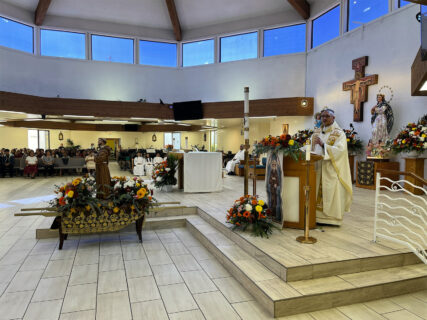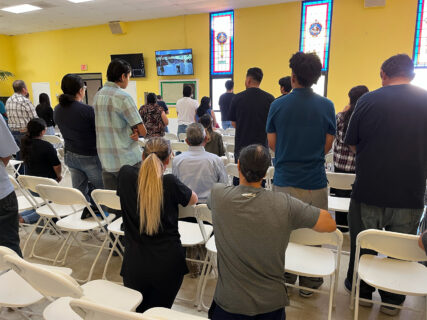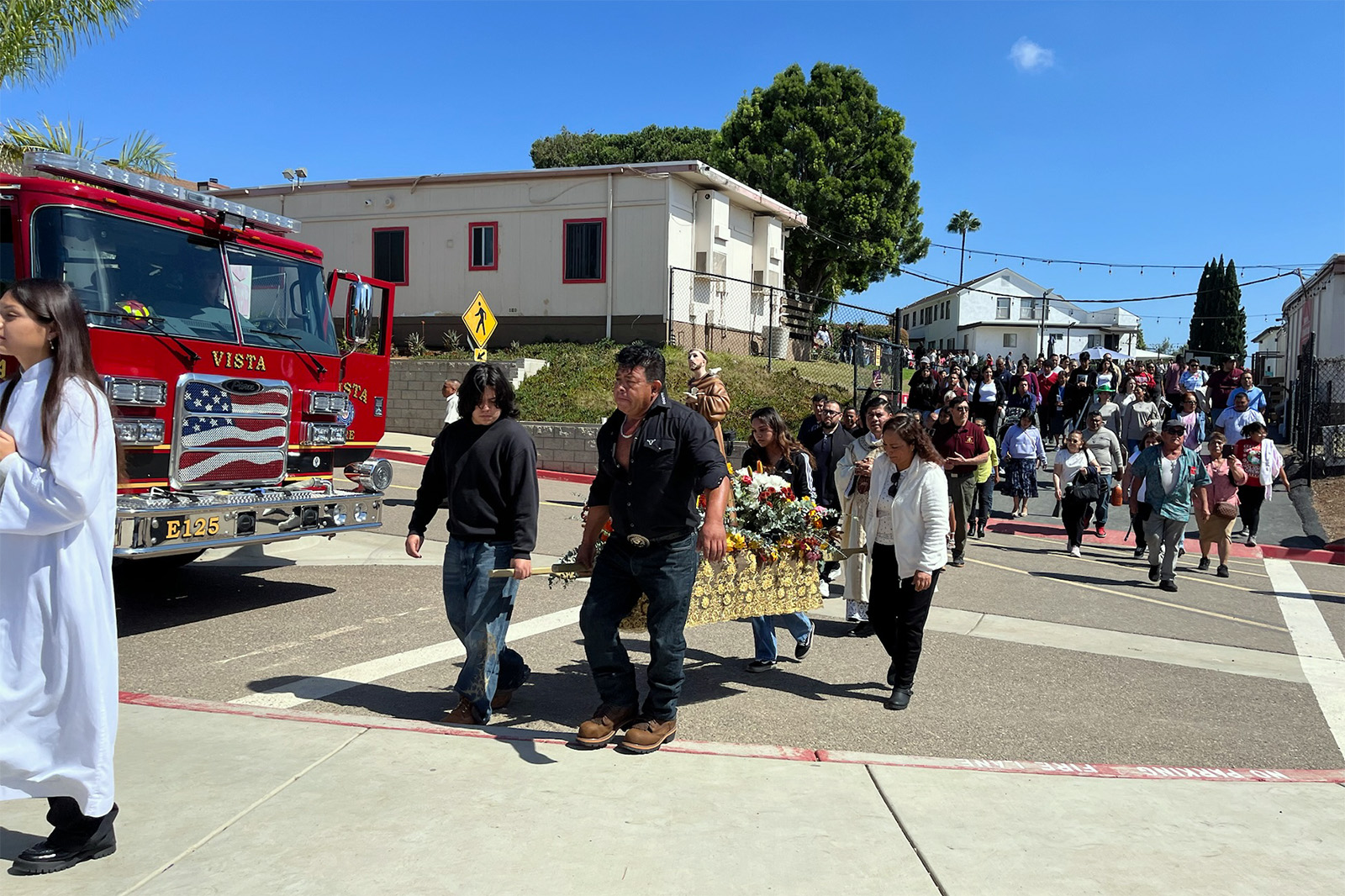
VISTA, Calif. (RNS) — In September, hundreds of members of St. Francis of Assisi Catholic Church gathered at a Vista City Council meeting to speak in support of a resolution to prohibit the city from working with federal immigration enforcement, unless legally required. Between them and opponents of the measure, the public comment period stretched to five hours and past midnight.
The measure narrowly passed, 3-2, but when the church’s pastor, the Rev. Rubén Arceo, later spoke about it in his homily, he wasn’t congratulating the Latino-majority congregation for its efforts. In Spanish, he told those assembled for a 1 p.m. Mass: “I’m glad it passed, but it didn’t make me happy because only 400 people from this church went.
“We are 13,000. Where were the 12,600 who come to Mass and receive Communion and hear the word of God every Sunday? Where were the 12,600 who did not go?” he asked. He preached that, despite receiving the sacraments, too many are “lost, self-absorbed and distant from God.”
“Rights are won, are fought for, are enjoyed, but with the work of everybody,” he said. “The demands of faith require you to go outside of yourself.”
The emphasis on this kind of civic engagement has made St. Francis of Assisi a unique force in Vista, a San Diego County city of about 100,000. The church experienced significant growth — going against the grain of a long-term decline in church attendance across the country — during the COVID-19 pandemic when it began holding services in its parking lot to abide by safety standards. With its growth has come political power that Arceo hopes will continue to make an impact as its community faces increased immigration enforcement and fear amid the Trump administration’s mass deportation efforts.
“ Our parish is 10% of the population of the city of Vista, so every time we do something and we show up, of course it’s intimidating for our civil leaders,” Arceo told Religion News Service in English. “ They see the whole parking lot full of people — and also the City Hall — and they know they’re from St. Francis.”
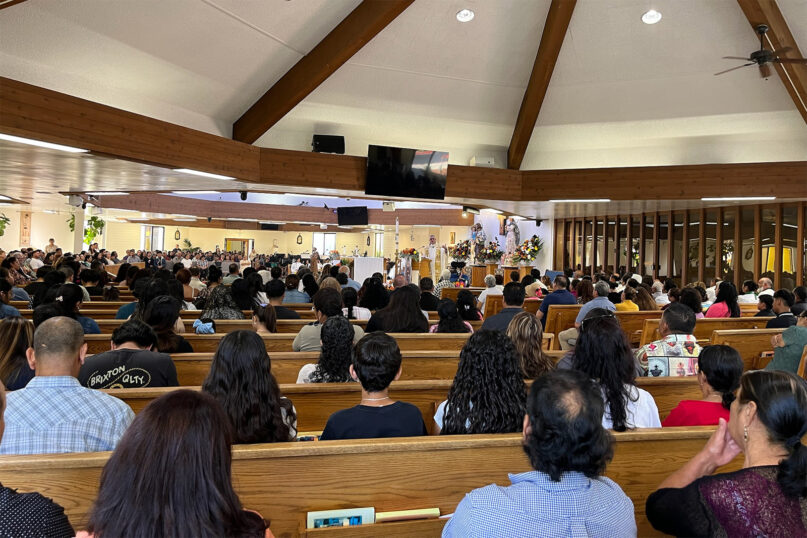
Parishioners attend a feast day Mass at St. Francis of Assisi Catholic Church, Oct. 5, 2025, in Vista, Calif. (RNS photo/Aleja Hertzler-McCain)
The Sunday in October that Arceo spoke about the City Council meeting, he preached indoors while the parish’s feast day festival began outside. The outdoor sanctuary — built in a former dirt parking lot where 11 a.m. and 1 p.m. Masses are normally held — was filled with stands run by volunteer church ministries, selling foods such as chiles rellenos, sopes, pupusas and flan. Parishioners and community members chatted, listened to mariachi and other Mexican regional music and waited for the blessing of the animals.
Despite what seemed like a crowd, parish volunteers said turnout was lower than expected. Parishioners had warned each other about federal immigration raids in the nearby city of San Marcos earlier in the week — another spike in the hum of fear that has permeated parish life since President Donald Trump was elected.
Half of the church’s eight weekend Masses are in Spanish, including the outdoor Masses, while some second- and third-generation Latino members attend services in English, alongside non-Latinos. A parish social justice ministry volunteer, Vanesa, said she knew of five members of the parish who had been deported or detained. She and social justice ministry volunteers asked to be identified by their first names only due to concerns about being targeted for their work.
The outdoor sanctuary was born of another fraught time for the parish. As the early days of the COVID-19 pandemic slammed the community, Arceo said the church held three to five closed-casket funerals a day, for children, adults and elderly parishioners.
But people still wanted to come to Mass and pray together, 6 feet apart. Its outdoor sanctuary was built by the beginning of April 2020. Parishioners designed a hydraulic system for drainage and used chainsaws to carve a crucifix and altar from a redwood tree that had succumbed to termites.
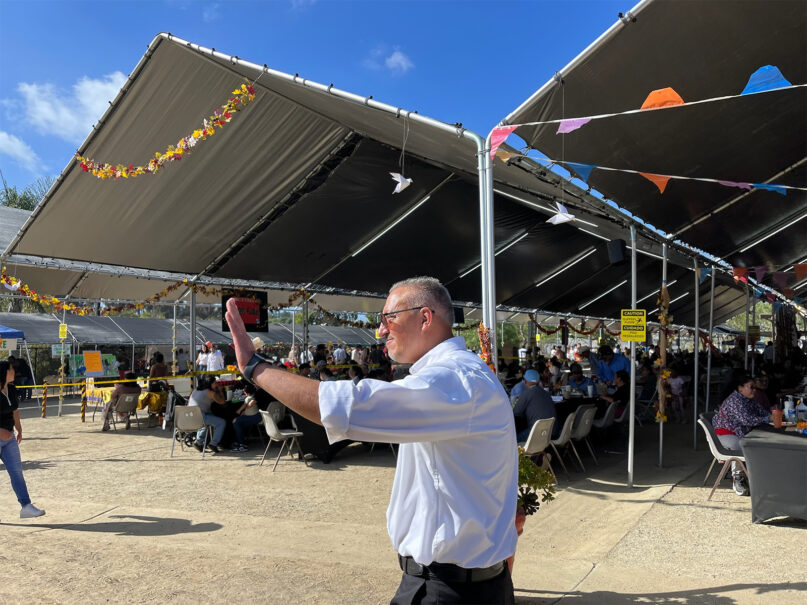
The Rev. Rubén Arceo greets parishioners at the outdoor sanctuary during the parish festival at St. Francis of Assisi Catholic Church, Oct. 5, 2025, in Vista, Calif. (RNS photo/Aleja Hertzler-McCain)
With other churches closed, Mass attendance exploded. Longtime parishioners said it’s been a joy to see the energy that the new ones bring to the community. The parish now has 930 volunteers, nine permanent deacons and three priests, Arceo said.
“Everywhere, everyone you see is working, working, working — work for their families, work for the church,” said Deacon Daniel Sánchez, who lamented that Latino communities like his often face inaccurate labels like “criminal” instead.
Elvia Ramirez, the director of religious education who managed the ticket booth at the parish festival, said the outdoor sanctuary has been “a great blessing.” Before, the church had to turn families away from catechism classes because it didn’t have the space, but now it can offer spaces to up to 900 families.
And for their political power in the city, the size of the parish “definitely does make a difference,” said Vanesa, who attended the Sept. 23 council meeting.
“We speak a lot about power, and we said that day (Sept. 23), ‘This church showed its power,’” said Teresa, a parish organizer. The parish has advocated for public policy change as part of the San Diego Organizing Project, a faith-based group that’s part of the statewide PICO California network.
Both women said the ministry’s priorities have been based on listening to parishioners about their needs. In 2023, the church was a significant presence in advocating for a local policy to increase affordable housing.
The September City Council resolution the parish supported will prevent immigration enforcement from accessing nonpublic city-owned or city-controlled property without a warrant, and prohibit city employees from sharing sensitive or personal data with immigration enforcement if not required by law, among other steps.
However, their campaign wasn’t without challenges. Several parishioners who attended the council meeting said they experienced racism and hate from people who opposed the resolution.
St. Francis’ catechism program has felt the brunt of increased fear of immigration enforcement, with attendance dropping from up to 900 families down to about 100 families, then coming up to about 300, Ramirez said. About 20 families who didn’t want to risk coming to catechism have taken her up on the offer for catechesis by phone. She now spends half an hour to an hour with each family on the phone every week.
Vanesa, meanwhile, took the lead to bring in Unión del Barrio, a secular community-based organization that organizes patrols to respond to immigration enforcement, to train the parish community. Congregants trained by the group now plan to patrol the parish’s perimeters during Mass and catechism, “ so that way if they see something, they can let us know ahead of time,” Vanesa said.
Arceo has seen the parish’s experience of mass deportation and family separation up close. Children have been taken into child protective services after both parents are deported, and he has witnessed “heartbreaking” decisions mothers have made as they struggle to make rent after their husbands are deported, he said.
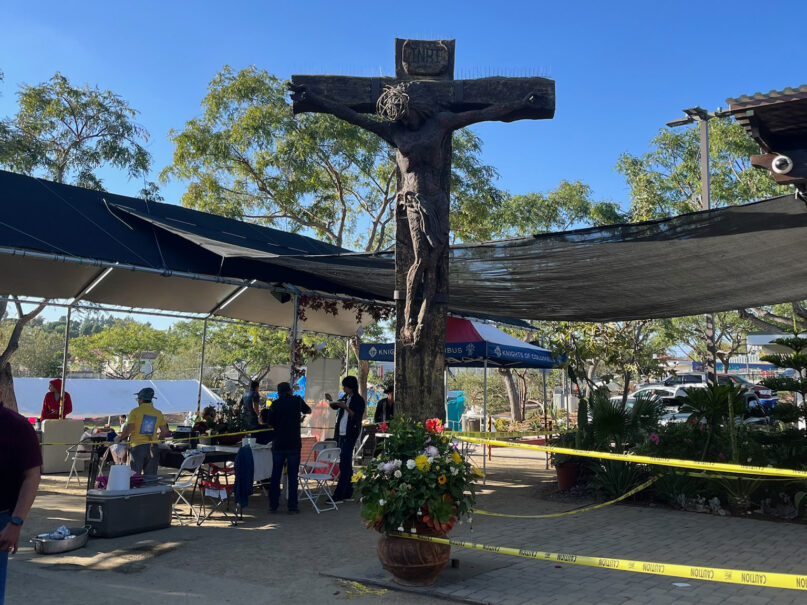
A crucifix carved from a former redwood tree adorns the outdoor sanctuary at St. Francis of Assisi Catholic Church, Oct. 5, 2025, in Vista, Calif. (RNS photo/Aleja Hertzler-McCain)
“ Yes, we can encourage spiritually and ask them to have faith to trust in God, but how does that apply to the immediate needs that they’re having?” Arceo said. “I can trust in God’s providence, but if I have two days to leave the apartment because I already owe two months of rent, what do you do?”
None of the sources of funding Arceo can tap will meet the needs of all of the local families, which include those outside St. Francis of Assisi, who have come to the parish asking for help, he said.
“It breaks my heart, and I feel powerless because what can I do?” Arceo said.
That feeling of powerlessness is familiar, he said. When he was 10 years old, he crossed the United States border with his parents. His family struggled, living in a garage without legal status, and he attended classes in English he didn’t understand.
“I know what it is to fear,” the priest said.
Because of an amnesty bill President Ronald Reagan signed in 1986, Arceo was able to obtain legal status — critical for his vocation to the priesthood — and eventually citizenship. Today, he said, some interested parishioners are unable to become permanent deacons because they lack legal status.
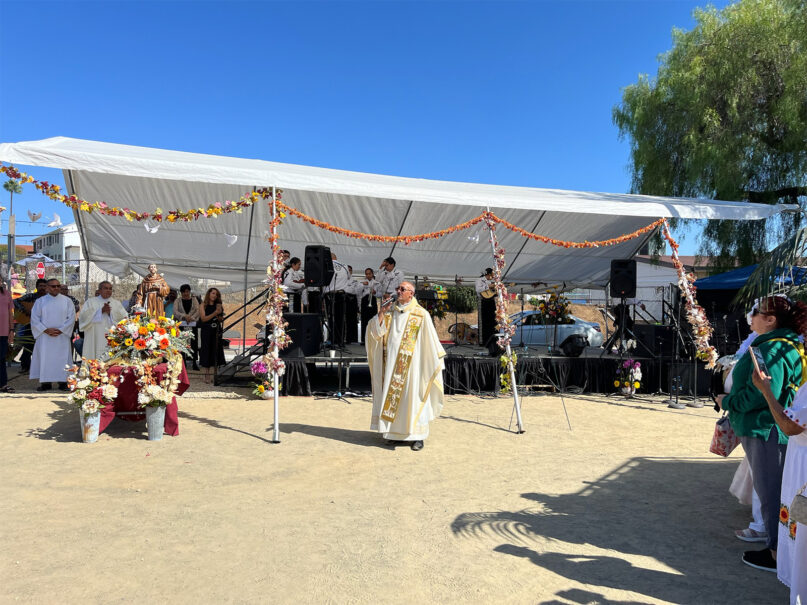
The Rev. Rubén Arceo, center, speaks at the outdoor sanctuary during the parish festival at St. Francis of Assisi Catholic Church, Oct. 5, 2025, in Vista, Calif. (RNS photo/Aleja Hertzler-McCain)
“My vocation grew out of this, a big desire to do something for people,” he said.
Walking through the festival, Arceo greeted people gathered with “Hola mija” and “Hola mijo,” terms of endearment meaning “my child,” especially common among Mexicans. He gave families a smile, wave or thumbs up and fielded requests for blessings before slipping away for an interview, where he told RNS he’s able to recognize most of his 13,000-strong flock.
Several parishioners credited Arceo with having a significant role in the parish’s growth. “Father Rubén is very welcoming,” Vanesa said.
Ramirez called Arceo a “super joyful person.”
“He loves to spend time with the people. I work in the office, too, and, spending time with him, he always has a smile, and he’s always very happy.”
Arceo says he wants his parishioners to understand that “this church is theirs. This church is not mine — I’m just their administrator.”
“We have to be courageous,” he said. “ As church, the gospel is very clear what we are called for, and together we have to make it happen. And if this means persecution, then we have some persecution.”

